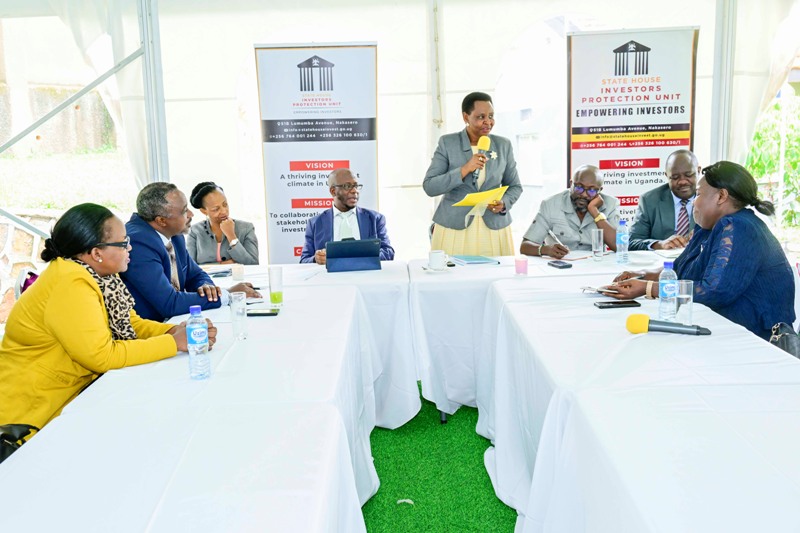Nakalema urges government agencies to unite for Uganda’s socio-economic transformation
During a high-level meeting held at the SHIPU offices in Kampala, Col. Nakalema spearheaded discussions focused on enhancing inter-agency collaboration and strategizing for national development.

The Head of the State House Investors Protection Unit (SHIPU), Col. Edith Nakalema, has rallied leaders of various government agencies to forge a united front in accelerating Uganda’s socio-economic transformation, emphasizing their critical role in achieving the ambitious goals outlined in the National Development Plan IV (NDPIV).
During a high-level meeting held at the SHIPU offices in Kampala, Col. Nakalema spearheaded discussions focused on enhancing inter-agency collaboration and strategizing for national development.
She underscored that Uganda’s growth aspirations, encapsulated in NDPIV, aim to significantly boost household incomes, fully monetize the economy, and ensure widespread employment for sustainable development.
“The goal of the plan is to achieve higher household incomes, full monetization of the economy, and employment for sustainable socio-economic transformation,” Col. Nakalema stated, reminding the agency heads that their positions reflect their competence and commitment to public service.
“Even more important beyond technical capability, we are public servants because we care about the future of this country. Therefore, we cannot afford to miss the opportunity to make a contribution towards securing the future which our NDPIV has charted out.”
She stressed that what binds these leaders is not merely the synergy of working jointly, but also the goodwill among them to propel Uganda forward. “The clarion call to advance socio-economic transformation therefore enjoins us to simultaneously deliver tangible results on every front of national service.”
Col. Nakalema urged the leaders to move beyond being mere “conveyor belts of service delivery” and instead form a “joined-up government” dedicated to driving national transformation rather than just meeting performance targets. She also encouraged them to proactively engage with the media to showcase their achievements and future directions to the citizenry.
Dr. Barirega Akankwasah, the Executive Director of the National Environment Management Authority (NEMA) and chairperson of the heads of government agencies, reiterated the importance of shared ideas for stabilizing and promoting government work, especially during periods of transition. “We should share views and ideas on how we can be relevant in supporting continued sustainability of peace and development of our country… We are CEOs for national stability,” he affirmed.
Echoing the call for accountability, Ms. Mercy Kainobwisho, the Registrar General of the Uganda Registration Services Bureau (URSB), emphasized the need to showcase positive outcomes and ensure effective service delivery to citizens.
Ms. Juliana Kagwa, the Chief Executive Officer of the Uganda Tourism Board (UTB), pointed out that siloed operations within agencies often stem from ineffective communication. She advocated for embracing youth innovation and engaging young people to create content that publicizes agencies’ campaigns and achievements.
Her sentiment was supported by Dr. James Musinguzi, Executive Director of the Uganda Wildlife Authority (UWA), who acknowledged that many government achievements remain unknown due to a lack of publicity.
Mr. Don Wanyama, Chief Executive Officer of the Vision Group, urged the leaders to consolidate the achievements of the NRM government and popularize its vision for the next five years, suggesting this would bolster future leadership. He proposed creating a task force to research and document Uganda’s progress over the last four decades.
Dr. Ezra Muhumuza, Executive Director of the Uganda Manufacturers Association (UMA), highlighted the role of government agencies in implementing the political regime’s manifesto, which he described as a social contract between the people and the government.
Eng. Ziria Tibalwa Waako, Chief Executive Officer of the Electricity Regulatory Authority (ERA), also reinforced the call to engage young people, particularly those between 15 and 40, as they constitute the majority and can easily become allies in development campaigns if approached with the right communication.
The meeting concluded with a renewed commitment from the agency heads to foster greater collaboration and transparency, aiming to collectively drive Uganda towards its socio-economic transformation goals.







